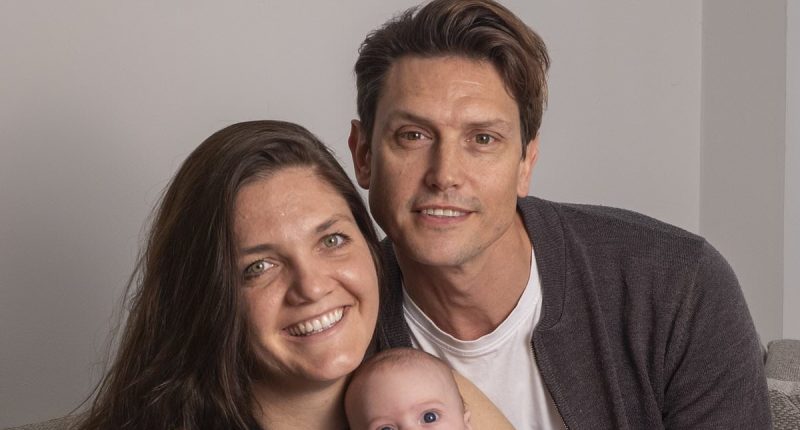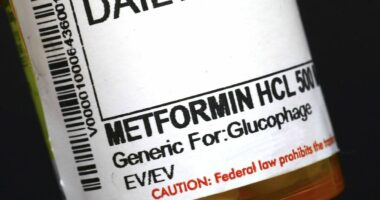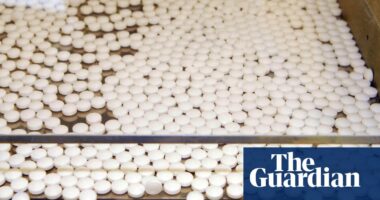Share this @internewscast.com
At ten weeks old, Rafferty Isaac is a specially miraculous bundle of joy to parents Lucy and Adam – because he was born twice.
Lucy was diagnosed with ovarian cancer while pregnant, so in a five-hour operation in her 20th week surgeons took out her womb – containing Rafferty – so that they could remove cancerous cells.
Rafferty was then returned to Lucy and was ‘born again’ at the end of January weighing 6lb 5oz.
Weeks later she took Rafferty back to John Radcliffe Hospital in Oxford to thank surgeon Hooman Soleymani Majd, who said: ‘It felt as if I had met him previously. It was a rare and a very emotional experience for me.’
Lucy, 32, was 12 weeks pregnant when she received the devastating cancer diagnosis after a routine ultrasound scan. Doctors at the John Radcliffe feared if they waited until Rafferty was born before treating her tumour, it would be likely to spread and pose a risk to Lucy’s life – and her pregnancy was too far advanced to allow surgeons to perform standard keyhole surgery.
Instead, a team headed by Mr Soleymani Majd proposed a radical operation which would lift Lucy’s womb out of her abdomen – still containing her unborn child – to allow them to examine and remove the cancerous cells on both ovaries behind the womb.
The procedure, with risks to both mother and child, has only been carried out a handful of times across the world and Mr Soleymani Majd has only performed it four times in ten years.
But special needs teacher Lucy, of Reading, and her musician husband Adam, 42, a former contestant on ITV’s The Voice, agreed to ‘put our faith’ in the team and the operation took place in October.

At ten weeks old, Rafferty Isaac (centre) is a specially miraculous bundle of joy to parents Lucy (left) and Adam (right) – because he was born twice

During the extraordinary operation, the womb, which remained connected to the uterine artery to maintain blood supply and oxygen, is held in the hands of two medics

Lucy, 32, was 12 weeks pregnant when she received the devastating cancer diagnosis after a routine ultrasound scan
It was Mr Soleymani Majd’s most complex procedure yet because her tumours were found to be grade two – which means cancer cells had also invaded tissues surrounding the ovaries.
But it was a resounding success and Rafferty was born safely at the end of January. It was especially emotional for the family as Adam had only been able to start a family after being given a kidney by a friend, which was transplanted in November 2022. Adam said: ‘To finally hold Rafferty in our arms after everything we have been through was the most amazing moment.’
Mr Soleymani Majd was supported by a team of 15, including three anaesthetists and five theatre nurses. He removed Lucy’s womb, which remained connected to the uterine artery to maintain a supply of blood and oxygen to Rafferty. It also stayed attached to the left fallopian tube and cervix.
The womb, the size of a football, was wrapped in a sterile warm saline pack to mimic being inside the body and keep it at the right temperature. This was in the hands of two medics throughout the op, and Rafferty’s heart rate and temperature monitored. The saline pack was replaced with a warmer one every 20 minutes when his temperature dropped.
The team removed a slice of the tumour which was examined by pathologists, who determined it was a grade two cancer.
Previous operations Mr Soleymani Majd has carried out involved grade one tumours, which are easier to remove. Once the cancerous tissue was removed, Lucy’s womb was placed gently back into position, the saline packs removed and her abdomen stitched back up.

It was Mr Soleymani Majd’s (pictured) most complex procedure yet because her tumours were found to be grade two – which means cancer cells had also invaded tissues surrounding the ovaries

Doctors at the John Radcliffe feared if they waited until Rafferty was born before treating her tumour, it would be likely to spread and pose a risk to Lucy’s life
In total, the womb was outside Lucy’s body for two hours – twice the time of Mr Soleymani Majd’s previous procedures.
She said she felt ‘incredibly lucky’ to have been diagnosed and treated for ovarian cancer, despite having no symptoms.
The disease affects 7,000 women every year in the UK and two -thirds are diagnosed late, when it is harder to treat. More than 4,000 women a year die from it.
Adam is now looking forward to competing in the British transplant games, in Oxford in July.












